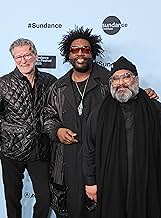Sly Lives! (aka the Burden of Black Genius)
- 2025
- 1 Std. 52 Min.
IMDb-BEWERTUNG
7,6/10
1261
IHRE BEWERTUNG
Füge eine Handlung in deiner Sprache hinzuIt focuses on the life and legacy of Sly and the Family Stone, telling the story behind the rise, reign and fadeout of one of pop music's most influential artists.It focuses on the life and legacy of Sly and the Family Stone, telling the story behind the rise, reign and fadeout of one of pop music's most influential artists.It focuses on the life and legacy of Sly and the Family Stone, telling the story behind the rise, reign and fadeout of one of pop music's most influential artists.
- Für 1 Primetime Emmy nominiert
- 4 Nominierungen insgesamt
Sly Stone
- Self - Singer, Sly & The Family Stone
- (Archivfilmmaterial)
Cynthia Robinson
- Self - Trumpet, Sly & The Family Stone
- (Archivfilmmaterial)
Empfohlene Bewertungen
A current documentary airing on Hulu from Oscar winner Questlove. Following the rise & eventual fall of Sylvester Stewart (Sly) & his band, we get a hallucinatory ascent of a mixed raced band who wowed audiences at Woodstock w/their mixture of rock & R & B which carried over to their many appearances on television at the time. Of course, one's demons reared its ugly head for Sly as his upward success came hand in hand w/his increasing drug use which by the time the late 70's rolled around the band were soon relegated to the past their prime heap but w/Questlove's expertise w/archival footage & interviews as well as modern takes on the band's output & influence from current songsmiths (Andre 3000 from Outkast, D'Angelo, Q-tip from A Tribe Called Quest) who put Sly & the Family Stone's music into righteous perspective.
This is fine and will do the job as placeholder. It's in the standard format of blending clips, stills, archive footage, with contamporaries being interviewed, to take us through a famous life, the ups and downs and perhaps lessons involved.
Here it's Sly Stone, who oould have been a Prince of sorts. Theatric, multifaceted, but it was the civil rights years, and his creative life mirrors that trajectory; ebullient hope to transcend boundaries, to bitterly dashed dreams.
One lesson, and it's generally offered, is that there was no scaffold, blueprint, on which to know what to do build next, how to play the role of superstar. He, along with everybody else, had to make it up as they went along. Another talking point here is 'black' genius, the particular tolls of it in a world where boundaries are drawn starkly against you.
There may be parallels with someone like Brian Wilson; 'genius' in being able to perceive music as visual world, as shared streets you explore, but limited in the means, work, and focused commitment required to consistently bring it to life.
At least his Riot album is as important as anything from the time, a dissonant extended improvisation on previous fabric of soul music, and that as mirroring a dissonant collapsing America. It's probably a cornerstone for all black music that followed.
My own takeaway is of a man who in terms of vision was second to none of the greats of the era; adept at improvising self, savvy enough to be able to see the larger fabric.
But there's no real stage for him to move to, fails to transcend, and probably had plenty of reasons against him. The drugs were probably ways to dissociate, make believe he was what he couldn't summon. So he periodically returns as caricature of himself, clowning it for the camera, unsure how to be the next version of himself.
Meanwhile, just as he was cratering, Bronx and Harlem youths were rediscovering him in record stores, and were about to speak once more about what he used to; the world of stark limits, and yet somehow joyful dance, ironically cruising through cracks. Interestingly, the new music, hip hop, would eschew the whole band format, and pare it down to narrator and rousing, sometimes soulful breaks that suggest world.
Here it's Sly Stone, who oould have been a Prince of sorts. Theatric, multifaceted, but it was the civil rights years, and his creative life mirrors that trajectory; ebullient hope to transcend boundaries, to bitterly dashed dreams.
One lesson, and it's generally offered, is that there was no scaffold, blueprint, on which to know what to do build next, how to play the role of superstar. He, along with everybody else, had to make it up as they went along. Another talking point here is 'black' genius, the particular tolls of it in a world where boundaries are drawn starkly against you.
There may be parallels with someone like Brian Wilson; 'genius' in being able to perceive music as visual world, as shared streets you explore, but limited in the means, work, and focused commitment required to consistently bring it to life.
At least his Riot album is as important as anything from the time, a dissonant extended improvisation on previous fabric of soul music, and that as mirroring a dissonant collapsing America. It's probably a cornerstone for all black music that followed.
My own takeaway is of a man who in terms of vision was second to none of the greats of the era; adept at improvising self, savvy enough to be able to see the larger fabric.
But there's no real stage for him to move to, fails to transcend, and probably had plenty of reasons against him. The drugs were probably ways to dissociate, make believe he was what he couldn't summon. So he periodically returns as caricature of himself, clowning it for the camera, unsure how to be the next version of himself.
Meanwhile, just as he was cratering, Bronx and Harlem youths were rediscovering him in record stores, and were about to speak once more about what he used to; the world of stark limits, and yet somehow joyful dance, ironically cruising through cracks. Interestingly, the new music, hip hop, would eschew the whole band format, and pare it down to narrator and rousing, sometimes soulful breaks that suggest world.
Sly Stone is an infinitely fascinating character and musician. His music will be around forever.
Qwestlove's obsession with Sly being a black genius is grating and he's projecting too much of his own outlooks instead of trying to find out and express just what Sly Stone's outlook was/is.
Most of the musicians interviewed in the doc, do not hold a candle to Sly's talent or achievements, so their opinions don't hold much weight.
The only interviews that were interesting were his band mates. And how could they not a find any of his contemporaries? How could they basically ignored his discography after Fresh? Or the quirky side projects he did.
This documentary had too much of a personal agenda that wasn't about Sly Stone. Still, the man was just that interesting that he shines through despite the negative issues.
Qwestlove's obsession with Sly being a black genius is grating and he's projecting too much of his own outlooks instead of trying to find out and express just what Sly Stone's outlook was/is.
Most of the musicians interviewed in the doc, do not hold a candle to Sly's talent or achievements, so their opinions don't hold much weight.
The only interviews that were interesting were his band mates. And how could they not a find any of his contemporaries? How could they basically ignored his discography after Fresh? Or the quirky side projects he did.
This documentary had too much of a personal agenda that wasn't about Sly Stone. Still, the man was just that interesting that he shines through despite the negative issues.
Follows a very standard bio-doc template... rise-fall-redemption. But I really liked the thread of black genius and the pressure placed on America's very best black performers. Most of the archival interview footage with Sly Stone was really compelling. He has a very good way of expressing himself meaningfully without capitulating to the awful questions people asked him. Right at the midpoint of the film, around the time when Sly Stone's run of genius albums is about to take a darker, inward turn, there is an interview clip of Dick Cavett interviewing Stone, with Cavett being a total, well, dick. Sly's response properly shames Cavett... and all us as well.
This is better than nothing of course and I must say that if it wasn't for quest love, this documentary probably wouldn't have been made. At the same time he ruined to some degree what could've been a stellar documentary. Quest love's personal theory about the burden of being a black genius, doesn't make any sense nor was it needed. Especially when you're trying to push the narrative that Sly was one of the first people to undergo it publicly as if Little Richard and James Brown and Chuck Berry didn't exist. There's a case to be made that the directors views completely contradict that of sly stone and you can clearly see that there's a clash there. I pray to God, someone comes along, and does a better documentary where Sly is telling his own story. The idea that black artists deserve to enjoy the fruits of their labor and die with their kids around them while plenty ignoring that those same black artists were irresponsible with their money and chose drugs over being responsible parents, is trick knowledge.
Wusstest du schon
- VerbindungenFeatures Dick Cavett Show: Folge vom 24. November 1970 (1970)
Top-Auswahl
Melde dich zum Bewerten an und greife auf die Watchlist für personalisierte Empfehlungen zu.
Details
- Laufzeit
- 1 Std. 52 Min.(112 min)
- Farbe
- Sound-Mix
Zu dieser Seite beitragen
Bearbeitung vorschlagen oder fehlenden Inhalt hinzufügen





































